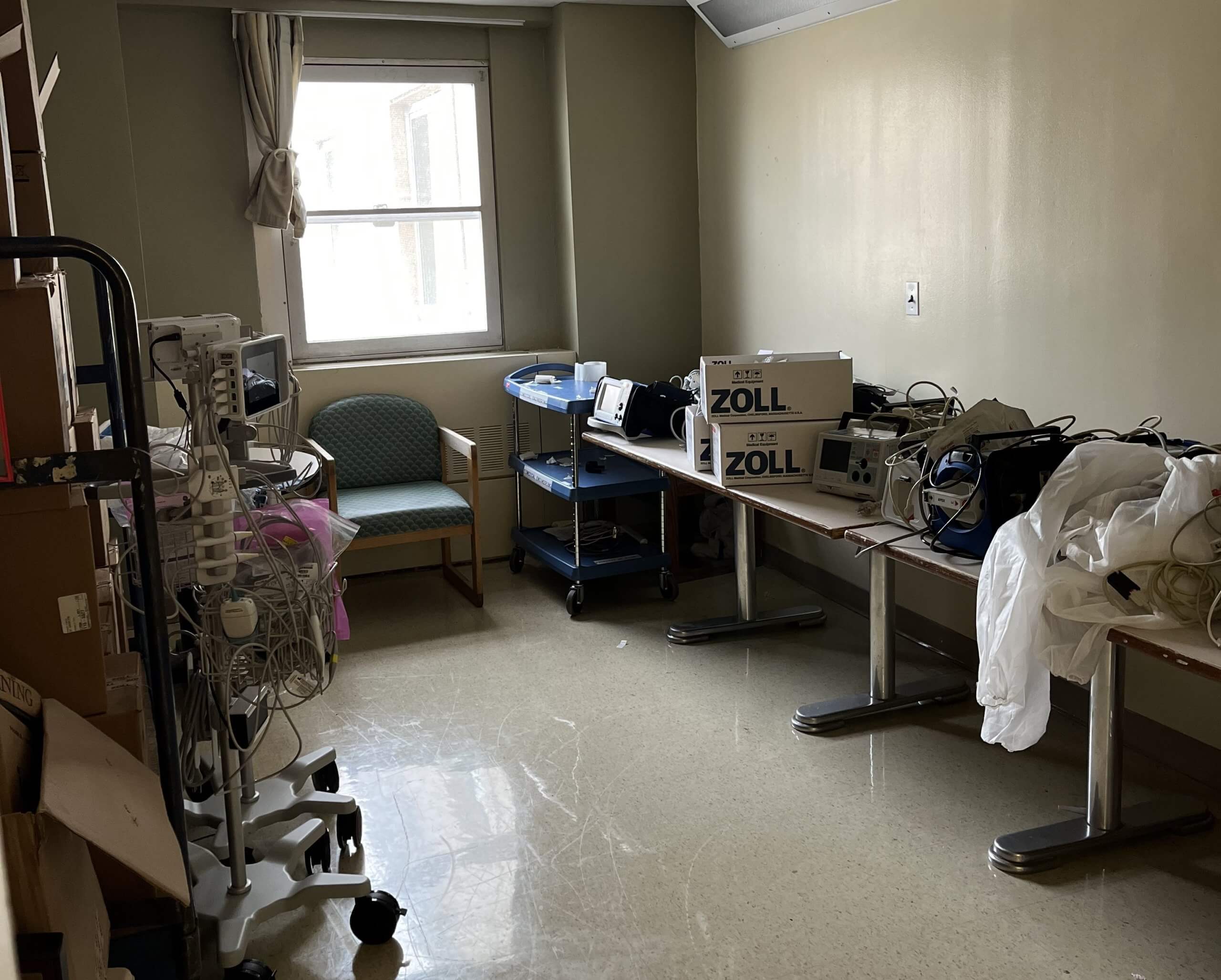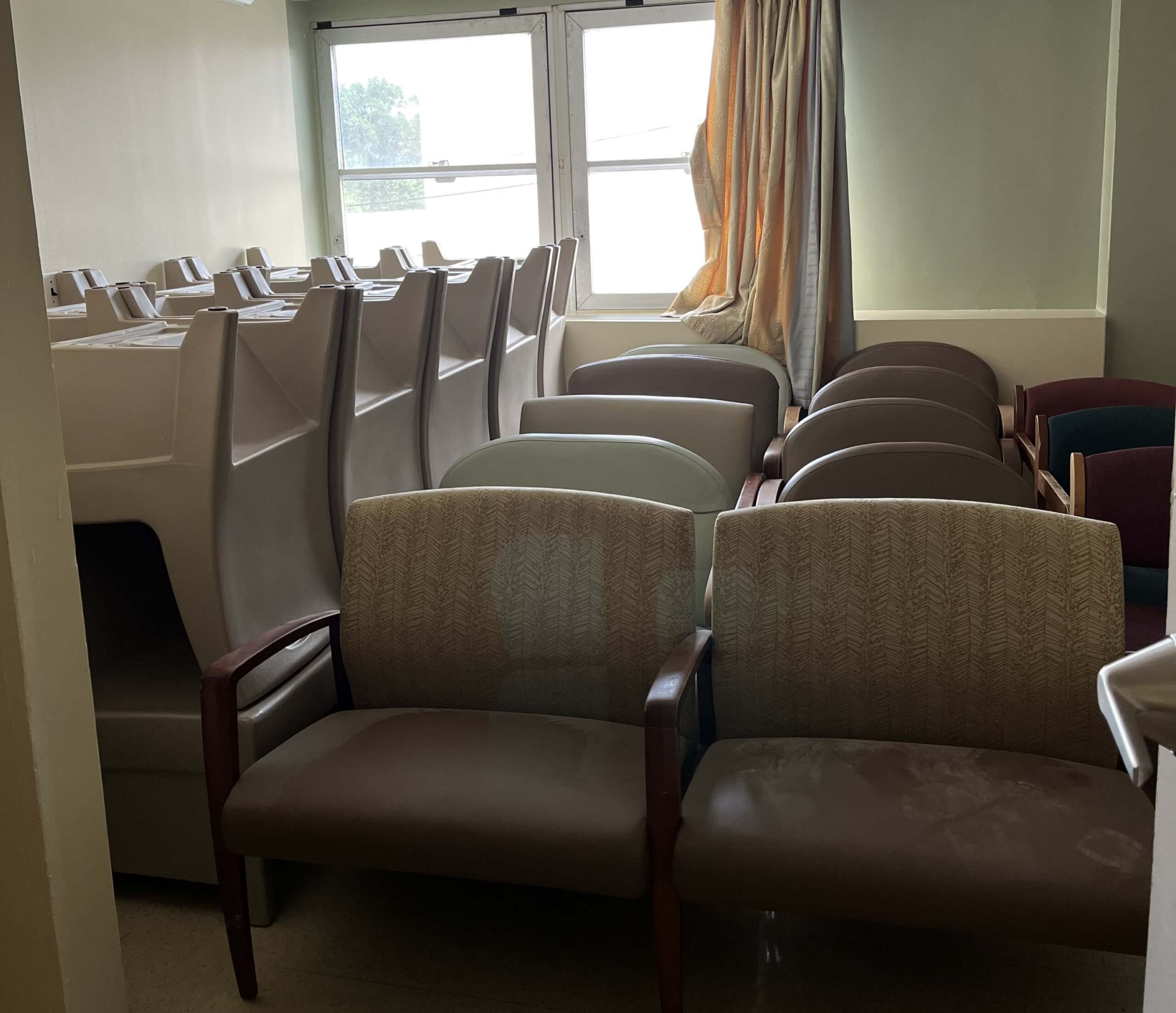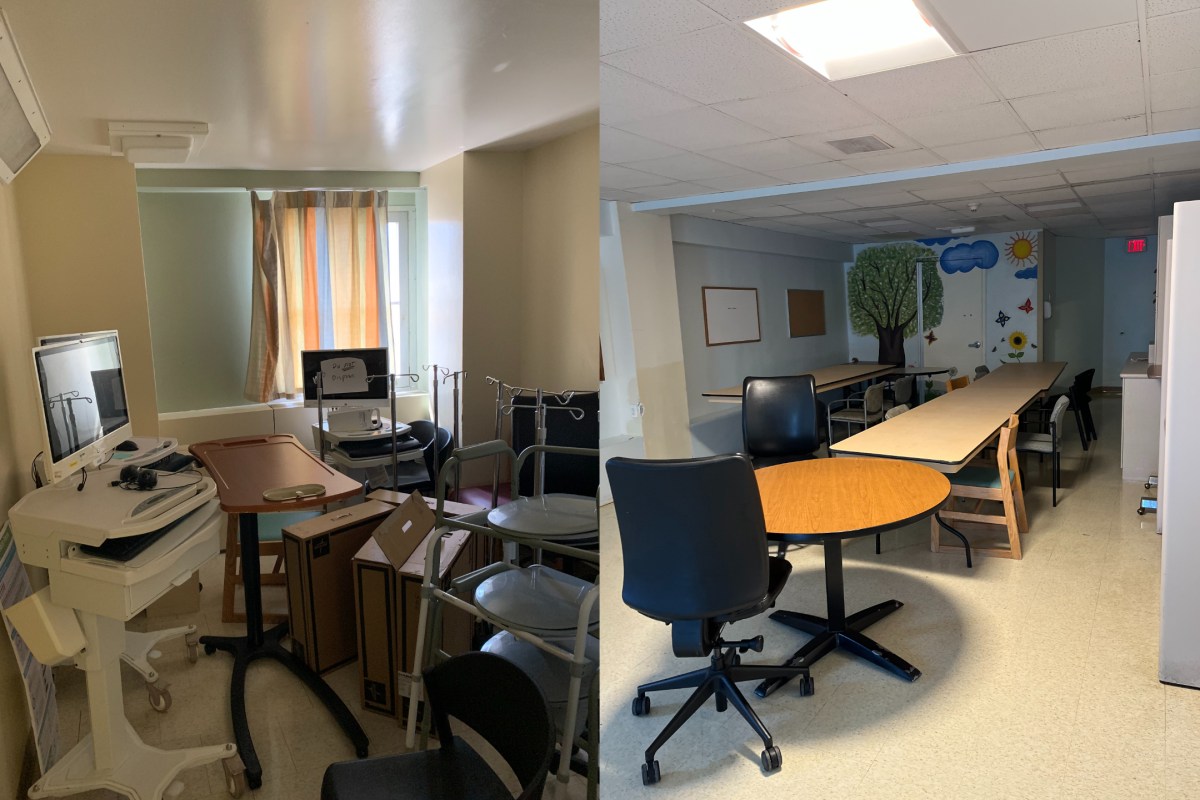Cluttered yet empty and idle: For about two years, that is how Northwell Health’s Syosset Hospital psychiatric unit has stayed.
Much like this, people visiting the hospital for a mental health crisis now wait idly and in distress – either in the emergency room or on the medical floor – for a psychiatric bed to open at a different facility, according to therapists and nurses who work there.
“We have a perfectly good unit not being properly utilized,” says Dawn Carr, a creative arts therapist at Syosset Hospital. “People are suffering more now than they were before the pandemic, but there are less beds and less services.”
In spring 2020, the Syosset Hospital psychiatric unit closed to accommodate Covid-19 patients. By summer 2020, all Covid-19 patients had cleared out of the unit – yet it remained closed. At that time, a group of psychiatric nurses rallied for the reopening of their unit to treat what experts call an ongoing mental health crisis.

One behavioral therapist, Kristy Gulotta, started a petition that got about 180 signatures from all kinds of staff members at the hospital to reopen it.
But since then, momentum for the cause has withered, Gulotta said.
“We keep getting told there’s no news whether it’s closing or opening,” Gulotta said. “[Mental health patients] are either discharged way too early or they’re stuck in the ER for days until we can find them a psych bed.”
When asked for details about the Syosset Hospital psychiatric unit, Jason Molinet, a spokesperson for Northwell Health, told the Press that the healthcare provider, the largest in New York State, “has the appropriate capacity to meet the inpatient mental health needs of the communities we serve.”
“Northwell is the largest regional provider of inpatient behavioral health services – we currently have over 550 behavioral health beds in operation and annually provide over 450,000 visits, which include a range of mental health and substance use disorders,” he added.
Northwell’s Zucker Hillside Hospital, located at Long Island Jewish Medical Center in New Hyde Park, has 226 of those beds, and South Oaks Hospital in Amityville has 202. The remainder are split between hospitals in Huntington, Port Jefferson, New York City, and Westchester.
In the past 10 years, Northwell has closed the psychiatric units at its hospitals in Plainview and Valley Stream, decreased the number of beds at others, and transferred beds to South Oaks.
In a recent public hearing to address mental health issues in New York, Carr and Gulotta each submitted testimony about the conditions at Syosset to New York State Attorney General Letitia James.
“The Syosset Hospital psychiatric unit is still considered a temporary closure due to Covid. However, after over two years, can it still be defined as temporary?” Carr said at the hearing. “This 20-bed unit remains empty; its only purpose is serving as a storage unit. How much longer will our mental health community be denied much-needed services?”
A spokesperson for New York State’s Office of Mental Health (OMH) did not specifically name Syosset Hospital, but said that on Long Island, “a number of hospitals have offline beds that will be returned to operation in accordance with their OMH-issued operating certificates and OMH regulations.”
The OMH also noted that state policies in recent years have sought to “right-size” certified psychiatric beds at each hospital, which has led to an overall net decrease of about 34 psychiatric beds on Long Island in the past five years. According to the OMH, there are 13 OMH-licensed or operated hospitals providing psychiatric inpatient services with a total of 1,016 psychiatric beds on Long Island.

Syosset Hospital Psychiatric Unit Workers Speak Out
Those on the ground at Syosset say that this is not enough, as the need for mental health hospitalization is only increasing, taking its toll on staff, patients, and the community at large.
Larry Wills, a psychiatric nurse, spent the first year of the Syosset Hospital psychiatric unit’s closure administering Covid-19 tests. Now, after a long career in psychiatric nursing, he is working on the medical floor.
“I specialize in psychiatry, and I’m working in the medical section now just struggling to stay afloat,” he says. “They haven’t fired or refused to pay us – we just do something else in the building.”
Carr and Gulotta have also been delegated to other tasks helping out around the hospital building. In addition, Gulotta continues to run a depression support group remotely since it can no longer meet on the psychiatric floor.
Wills says that he is the only one left holding the title of psychiatric nurse at Syosset Hospital; the others, about 25 nurses, found different positions for fear of being laid off should the unit permanently close. Wills, however, has decided to stick it out. He says it “would be great” for the unit to reopen so he could be there for his patients.
“We had a lot of patients, and it’s like, what’s happening to them?” Wills says. “It’s not that we didn’t care about them. When you have a psych unit, it becomes that patient’s safe place. They may be feeling suicidal and they know they can come here and they can see me and [Gulotta] and the other nurses, and we’re going to take care of them and keep them safe and get them through this crisis.”
Most of the patients that would go to the Syosset Hospital psychiatric unit are schizophrenic or suicidal, the psychiatric team says. Services would include therapy, socialization and group therapy with other patients on the floor, and medication management, which are not available in the medical unit.
Though the hospital does have a psychiatrist, the team says he works on an as-needed basis, and medications take longer to get to patients.
In addition, the nurses advocate for inpatient psychiatric beds close to patients’ homes and medical staff that understand the unique mental health needs of the community.
“Some of these people do struggle to care for themselves and are in danger to themselves and others, putting patients and communities at risk,” Carr says. “It’s just not fair because services in general weren’t great to begin with and they keep getting worse.”
Carr adds that an increasing number of psychiatric patients across Long Island end up on the streets when they are not able to get to a local psychiatric unit. Transportation to a unit that’s further away is not always possible for someone experiencing a mental health crisis, she adds, and also means that they cannot always be visited by loved ones.
“Right now, our psych population is not getting adequate services,” Gulotta says. “Either they wait for days and days in the ER, or they end up on medical floors where the medical staff are not equipped to handle the psychiatric needs of the patient. It’s very sad to see.”
Gulotta says that Syosset Hospital is also one of the few that previously could treat medical problems of psychiatric patients alongside their mental health needs. She has contacted New York’s attorney general in a last-ditch effort to reopen the unit.
Related Story: Cuomo Set Out to “Transform” Mental Health Care for Kids. Now They Can’t Get Treatment.






























